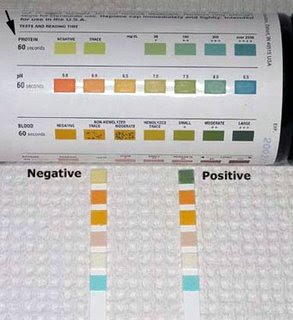 An article by van de Velde et al in this month’s JASN describes the results of the Prevention of Renal and Vascular End-stage Disease (PREVEND) study, a cohort study in which the ability to predict the need for renal replacement therapy based on albuminuria screening of the general population was performed. The study looked at over 40,000 individuals from the Netherlands over a wide range of ages, health and disease who had urine albumin measured. They found that a severely elevated urine albumin (>100 mg/L) is associated with a hazard ratio of 37 of needing RRT over a 10-year period, while a more modestly elevated urine albumin (between 20-100mg/L) is associated with a hazard ratio of 3 of needing RRT. While renal failure certainly occurred more commonly in those with standard risk factors (e.g., diabetes, vascular disease, early-onset hypertension), the authors demonstrate that between 40-50% of patients with albuminuria detected on screening did not have one of these risk factors. They conclude that aluminuria screening for the general population would be a good idea to identify those at risk for worsening renal function, particularly because a treatment known to slow the progression of proteinuric CKD (ACE-I/ARB therapy) is now readily available.
An article by van de Velde et al in this month’s JASN describes the results of the Prevention of Renal and Vascular End-stage Disease (PREVEND) study, a cohort study in which the ability to predict the need for renal replacement therapy based on albuminuria screening of the general population was performed. The study looked at over 40,000 individuals from the Netherlands over a wide range of ages, health and disease who had urine albumin measured. They found that a severely elevated urine albumin (>100 mg/L) is associated with a hazard ratio of 37 of needing RRT over a 10-year period, while a more modestly elevated urine albumin (between 20-100mg/L) is associated with a hazard ratio of 3 of needing RRT. While renal failure certainly occurred more commonly in those with standard risk factors (e.g., diabetes, vascular disease, early-onset hypertension), the authors demonstrate that between 40-50% of patients with albuminuria detected on screening did not have one of these risk factors. They conclude that aluminuria screening for the general population would be a good idea to identify those at risk for worsening renal function, particularly because a treatment known to slow the progression of proteinuric CKD (ACE-I/ARB therapy) is now readily available.
In the same issue, there is also an accompanying editorial in which the author disagrees with the above conclusion, suggesting that screening the entire population for proteinuria would likely not be cost-effective and would only rarely prevent the need for RRT.
